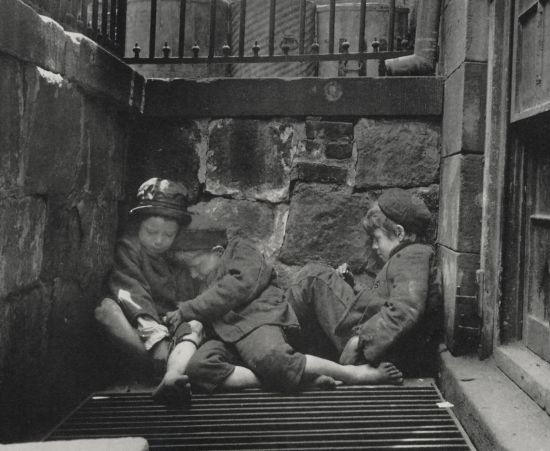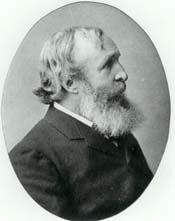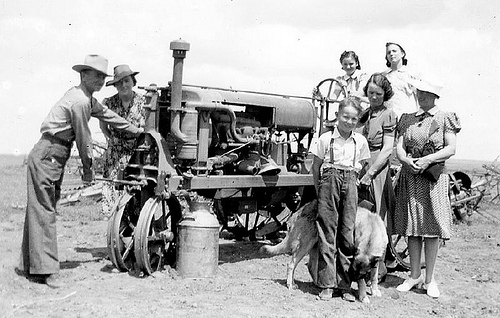Charles Loring Brace
by Andrew Boyd
Today, for the love of children. The University of Houston's College of Engineering presents this series about the machines that make our civilization run, and the people whose ingenuity created them.
The 1849 report by New York's police chief was unimaginable: the number of children living on the streets accounted for fully one percent of the city's population. Social stratification fueled by the industrial revolution had taken its toll. Scattered efforts to build orphanages were underway, but no broadly organized safety net was in place. "Help" for vagrant children often meant incarceration.

A photo of sleeping, homeless children [Wikipedia/Jacob Riis]
Presbyterian minister Charles Loring Brace was moved to action. But what action? More orphanages? Where would the money come from?

Charles Loring Brace [Wikipedia]
Brace had a different idea. The children, he believed, needed more than a roof over their heads. They needed hard-working, God-fearing, Protestant families to nurture their good instincts while stamping out the bad. The families he envisioned were the essence of rural farming communities. So Brace rounded up homeless, inner-city children and shipped them off to America's heartland.
And ship them off he did. For seventy-five years ending in 1929, Brace and his successors transplanted an estimated 105,000 children in what history would deem the Orphan Trains Movement. Including other agencies that followed Brace's example, more than a quarter million children were moved from the city to the country in one of the greatest feats of social engineering ever undertaken in the U.S. Farming families welcomed the children with varying mixtures of love and pragmatic self-interest. Extra hands were always welcome when working the fields.
Brace was not only aware of the farmers' need for labor; he expected it would propel his program to success. Young souls needed reform. Farmers needed workers. It was a match made in heaven.

Children photographed on a farm in Oklahoma [Flickr/gem66]
By today's standards, the process by which children were gathered and disbursed was frightful. Screening of the children and recipient families was minimal and often ignored. Home placement was the result of interested families picking who they liked when a trainload of children arrived in town. Families were expected to treat the children as their own, but poor records were maintained, and evidence is spotty regarding how the children fared. Two became state governors; another, a Supreme Court justice. Many others, however, found trouble with the law. The majority seem to have lived pretty ordinary lives which, given the hand they'd been dealt, was quite an accomplishment.
For the many failings of his plan, on the whole history's been kind to reverend Brace. Foremost in defining his legacy was his rejection of orphanages in favor of family homes. At a time when our country's future course for dealing with homeless children wasn't clear, Brace's vision led to the system of foster care and adoption we now rely on. His organization, the Children's Aid Society, remains active in the New York City area to this day. Perhaps that is his greatest legacy of all.
I'm Andy Boyd at the University of Houston, where we're interested in the way inventive minds work.
(Theme music)
Notes and references:
An excellent collection of images can be found on the website: http://thesocietypages.org/socimages/2009/03/20/the-orphan-train/. Accessed November 19, 2013.
C. L. Brace. The Best Method of Disposing of Our Pauper and Vagrant Children. 1859. http://pds.lib.harvard.edu/pds/view/3290622?n=1&s=4&printThumbnails=no. Accessed November 19, 2013.
C. L. Brace. The Dangerous Classes of New York and Twenty Years' Work Among Them. 1872. From the Adoption History Project at the University of Oregon website: http://pages.uoregon.edu/adoption/archive/BraceDCNY.htm. Accessed November 19, 2013.
S. O'Connor. Orphan Trains: The Story of Charles Loring Brace and the Children He Saved and Failed. Chicago: University of Chicago Press, 2004.
This episode first aired on November 21, 2013.